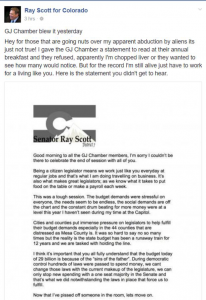If you’re a progressive, you can criticize the ultra-conservative Centennial Institute for a lot of things, like being homophobic, Islamophobic, and more, but being scared of a open debate is one thing the organization is not.
Centennial Institute founder, John Andrews, began the tradition of inviting questions and discussion, and the current director, Jeff Hunt, is carrying it on.
For example, he’s enlisted a longtime Denver reporter Joey Bunch, now leading the political news site ColoradoPolitics, to ask questions of gubernatorial candidates at the July 21-23 Western Conservative Summit, billed as the “largest gathering of conservatives outside of Washington, D.C.”
And Hunt has put no restrictions on his questions.
Contrast that with approach taken by the conservative billionaires, Charles and David Koch, when they held a big shindig in Colorado Springs last month of Republican politicians and donors associated with the Kochs’ Seminar Network.
As they’ve done in the past, the Kochs set ground rules for reporters, whom they invited to cover the event. One rule prohibited journalists from reporting on who was there, unless they were part of a formal program or the attendee gave permission to a reporter, according to Bunch. In other words, the presence of a person was off the record, unless permission was given or they were on the program.
Bunch said no thanks.
“A reporter’s most valuable asset is his independence,” Bunch told me via email. “It’s a tall order to tell a reporter he can’t report what he sees for the price of admission. I was very appreciative of the invitation, don’t get me wrong, and I knew I was risking losing some stories, maybe big stories, but it didn’t feel right at the gut level, so I asked and my editors backed me up. I was proud of that. A lot of editors would have said, ‘No. we want the scoops.'”
Judging from the reaction to similar, if not identical, restrictions imposed by the Kochs at other gatherings, journalists differ on whether the benefits of attending such events, even with the restrictions, outweighs the downsides.
I’d rather have a partially muzzled reporter in the room with the Kochs than none, but journalists who attend such events should inform us that restrictions were placed on their reporting, as outlets such as USA Today and the Washington Post have done in the past.
But I couldn’t find any reference to media restrictions in the coverage of last month’s Colorado Springs Koch event, including in reporting by the Associated Press, Denver Post, NBC News, Politico, and others.
Emails to the Associated Press, Denver Post, and Politico were not immediately returned. I’ll update this post if I they respond.
In any case, I wouldn’t expect the Centennial Institute to try to do this, especially at a gathering of 4,000 people, of course, but at any forum. Hunt says there are not restrictions on journalists. They even let Samantha Bee loose at last year’s Summit.
And Hunt’s choice of a journalist to interview gubernatorial candidates at its upcoming Summit is along the same lines of openness to honest debate.
At the Summit, each Colorado gubernatorial candidate will be allowed a five-minute speech, and Bunch will ask ten minutes of questions to the group. Attendees will have the opportunity to vote on their favorite candidate, just as they did among vice presidential hopefuls last year, choosing former U.S. House Speaker Newt Gingrich. The results will be announced later.
Among the Republican candidates, 18th Judicial District Attorney George Brauchler and businessmen Victor Mitchell and Doug Robinson accepted invitations to attend so far. The only Democrat to respond is U.S. Rep. Ed Perlmutter, who’s declined.
Why did Hunt pick Bunch to do the interview segment of the program?
“We’re doing the gubernatorial race,” replied Hunt. “Let’s get someone who really knows Colorado politics. I’ve done a number of interviews with Joey, and he’s fair, and he knows Colorado really well. And he’s real entertaining. So let’s put him up there.”
But Hunt wouldn’t put just any journalist on the stage.
He said that some outlets like CNN, New York Times, and Washington Post “seem hell bent trying to delegitimize the President instead of reporting the news.”
That’s why he’s glad Trump is fighting reporters.
“Donald Trump is teaching conservatives again how fight against the media,” Hunt said, whose Centennial Institute is associated with Colorado Christian University. “Frankly, we need to learn how to fight those types of aggressive attacks against us.”
Hunt doesn’t accuse all journalists as being unfair. He said the Denver weekly Westword is one of the “fairest newspapers” he’s dealt with so far in Colorado. He also likes 9News anchor Kyle Clark, Denver Post Editor of the Editorial Pages Chuck Plunkett, and others.
Conservatives should give journalists (mainstream, left, or right) a chance and not initially look at media outlets as if they are “out to get me,” Hunt said.
As the media world implodes, that’s also good advice for progressives or anyone.
 The Fake News Pledge has now been signed by seven state lawmakers, all Democrats: State Representatives Mike Foote of Lafayette, Susan Lontine of Denver, Michael Merrifield of Colorado Springs, and Michael Weissman of Aurora as well as State Sen. Irene Aguilar of Denver, State Senate Minority Leader Lucia Guzman of Denver, and State Sen. Dominick Moreno of Commerce City.
The Fake News Pledge has now been signed by seven state lawmakers, all Democrats: State Representatives Mike Foote of Lafayette, Susan Lontine of Denver, Michael Merrifield of Colorado Springs, and Michael Weissman of Aurora as well as State Sen. Irene Aguilar of Denver, State Senate Minority Leader Lucia Guzman of Denver, and State Sen. Dominick Moreno of Commerce City.

